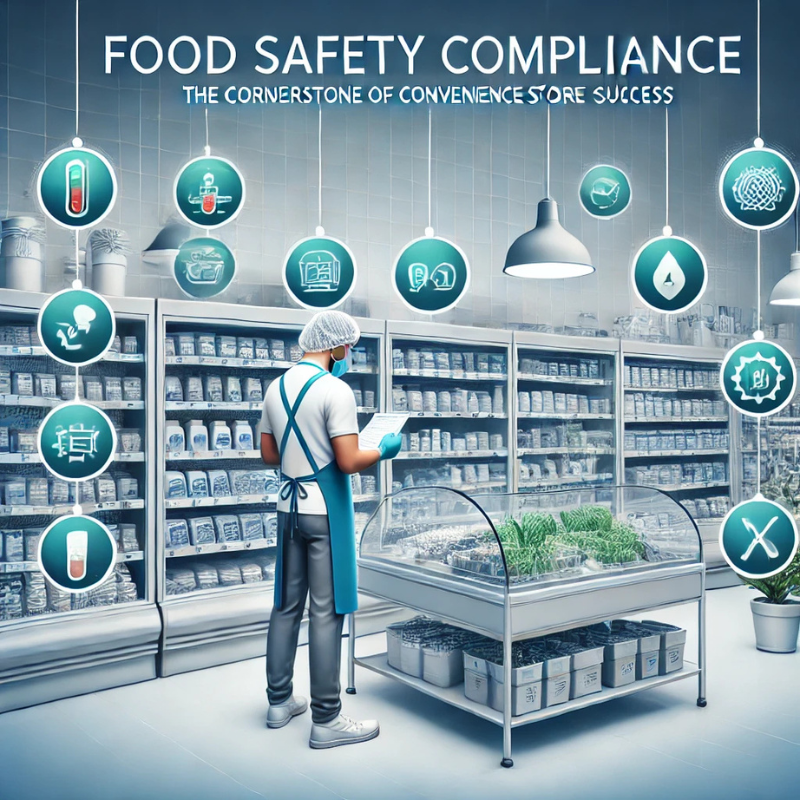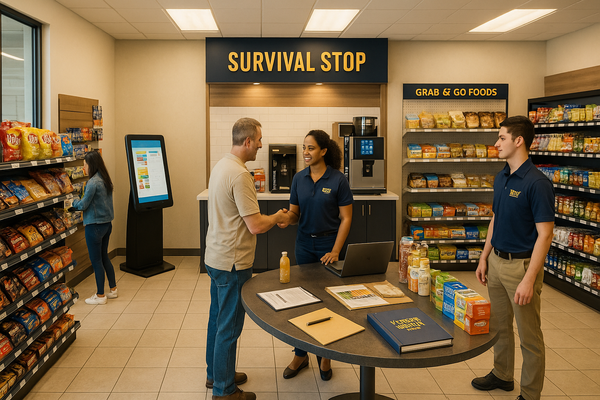The Importance of Food Safety Compliance in Convenience Stores
Discover the critical importance of food safety compliance in convenience stores. This comprehensive guide provides essential strategies for all staff levels to ensure safe food handling practices and maintain customer trust.

The importance of food safety compliance in convenience stores cannot be overstated. Convenience stores are a vital part of our daily lives, offering quick access to food, drinks, and other essentials. However, with this convenience comes a significant responsibility to ensure that the food sold is safe for consumption. This article explores why food safety compliance is essential in convenience stores and how it impacts both consumers and business owners.
Consumer Protection
First and foremost, food safety compliance protects consumers. When people purchase food from convenience stores, they expect it to be safe. Foodborne illnesses can lead to severe health issues, and in some cases, they can even be life-threatening. Ensuring that all food products meet safety standards reduces the risk of contamination. Convenience store owners must implement strict hygiene practices, including regular cleaning and sanitizing of surfaces, proper food handling, and monitoring of food storage temperatures. By doing so, they can prevent the spread of harmful bacteria and viruses.
Store Reputation
Moreover, food safety compliance helps maintain the store's reputation. In today's digital age, news about food News of safety issues can travel fast on social media and review websites. A single incident of food poisoning linked to a convenience store can lead to a significant loss of customers and a damaged reputation. Consumers are more likely to choose stores that prioritize food safety. By adhering to food safety regulations, convenience stores They can earn their customers' trust, which encourages them to keep coming back and positive word-of-mouth recommendations.
Legal Requirements
In addition to protecting consumers and maintaining reputation, food safety compliance is also a legal requirement. Government agencies set strict regulations that convenience stores must follow to ensure public health. These regulations cover everything from employee hygiene practices to food storage and preparation methods. Not following these laws can lead to large fines, legal action, and even closure of the business. Convenience store owners must stay informed about local, state, and federal regulations to ensure they are in compliance.
Staff Training
Training staff on food safety practices is a crucial aspect of compliance. Employees must understand the importance of food safety and how to implement best practices. Frequent training sessions can keep employees informed about the newest rules and techniques for handling food safely. Additionally, creating a culture of food safety within the store can empower employees to take ownership of their roles in maintaining compliance. When staff members are well-informed and committed to food safety, the likelihood of mistakes decreases significantly.
Food Storage
Another critical factor in food safety compliance is proper food storage. Convenience stores often carry a wide variety of products, including perishable items like dairy, meat, and fresh produce. Each of these products has specific storage requirements to prevent spoilage and contamination. For example, perishable items should be stored at appropriate temperatures to inhibit bacterial growth. Frequently checking the expiration dates and conducting inventory checks can help ensure that only safe, high-quality products are available for customers.
Product Labeling
Proper labeling of food products is also vital for food safety compliance. Clear labels help buyers make smart choices about the products they buy. Labels should include information about ingredients, allergens, and expiration dates. This transparency not only fosters trust but also protects consumers with food allergies or dietary restrictions. Convenience stores must ensure that all food items are accurately labeled to meet regulatory requirements and consumer expectations.
Technology Implementation
The role of technology in food safety compliance cannot be overlooked. Many convenience stores now utilize advanced technology to monitor food safety practices. For instance, temperature monitoring systems can alert staff if food storage areas exceed safe temperature ranges. Additionally, inventory management software can help track expiration dates and alert employees when items need to be removed from shelves. By leveraging technology, convenience stores can enhance their food safety compliance efforts and reduce the risk of human error.
Consumer Education
Consumer education is another important aspect of food safety compliance. Convenience stores can play a role in educating their customers about safe food handling practices. Providing information on proper storage, cooking temperatures, and food safety tips can empower consumers to make safer choices. This not only benefits the customer but also reflects positively on the store. When customers feel informed and supported, they are more likely to return and recommend the store to others.
Conclusion
In conclusion, the importance of food safety compliance in convenience stores is multifaceted. It protects consumers from foodborne illnesses, helps maintain the store's reputation, and is necessary for legal compliance. Training staff, ensuring proper food storage and labeling, leveraging technology, and educating consumers are all essential components of a successful food safety compliance strategy. Convenience store owners must prioritize these efforts to create a safe shopping environment, foster customer trust, and ultimately drive business success. The commitment to food safety compliance It not only protects public health but also improves the shopping experience for everyone. By understanding and implementing these practices, convenience stores can thrive while keeping their customers safe.





